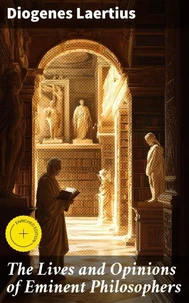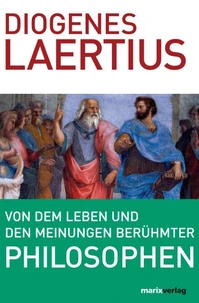The Lives And Opinions Of Eminent Philosophers (Unabridged)
Par : ,Formats :
Disponible dans votre compte client Decitre ou Furet du Nord dès validation de votre commande. Le format MP3 est :
- Pour les liseuses autres que Vivlio, vous devez utiliser le logiciel Adobe Digital Edition. Non compatible avec la lecture sur les liseuses Kindle, Remarkable et Sony
 , qui est-ce ?
, qui est-ce ?Notre partenaire de plateforme de lecture numérique où vous retrouverez l'ensemble de vos ebooks gratuitement
Pour en savoir plus sur nos ebooks, consultez notre aide en ligne ici
- FormatMP3
- ISBN978-1-6693-7427-5
- EAN9781669374275
- Date de parution05/04/2022
- Protection num.pas de protection
- Taille1517 Mo
- Infos supplémentairesaudio
- ÉditeurEverest Media LLC
Résumé
Please note: This audiobook has been created using AI voice.
These brief biographies of more than eighty philosophers of ancient Greece were assembled by Diogenes Laërtius in the early third century. He based these on a variety of sources that have since been lost. Because of this, his biographies have become an invaluable source of information on the development of ancient Greek philosophy, and on ancient Greek culture in general.
Most of what we know about the lives and otherwise lost doctrines of Zeno the Stoic and Diogenes the Cynic, for example, come from what Diogenes Laërtius preserved in this book. Mourning what else we have lost, Montaigne wrote: "I am very sorry we have not a dozen Laërtii." Steamy romance, barbed humor, wicked cattiness, tender acts of humanity, jealous feuds, terrible puns, sophistical paradoxes, deathbed deceptions, forgery, and political intrigue .
while the philosophers of ancient Greece were developing their remarkable and penetrating philosophies, they were also leading strange and varied lives-at times living out their principles in practice, at other times seeming to defy all principle. Diogenes Laërtius collected as much biographical information as he could find about these ancient sages, and tried to sift through the sometimes contradictory accounts to find the true story.
He shares with us anecdotes and witty remarks and biographical details that reveal the people behind the philosophies, and frequently adds a brief poem of his own construction that comments sardonically on how each philosopher died.
Most of what we know about the lives and otherwise lost doctrines of Zeno the Stoic and Diogenes the Cynic, for example, come from what Diogenes Laërtius preserved in this book. Mourning what else we have lost, Montaigne wrote: "I am very sorry we have not a dozen Laërtii." Steamy romance, barbed humor, wicked cattiness, tender acts of humanity, jealous feuds, terrible puns, sophistical paradoxes, deathbed deceptions, forgery, and political intrigue .
while the philosophers of ancient Greece were developing their remarkable and penetrating philosophies, they were also leading strange and varied lives-at times living out their principles in practice, at other times seeming to defy all principle. Diogenes Laërtius collected as much biographical information as he could find about these ancient sages, and tried to sift through the sometimes contradictory accounts to find the true story.
He shares with us anecdotes and witty remarks and biographical details that reveal the people behind the philosophies, and frequently adds a brief poem of his own construction that comments sardonically on how each philosopher died.
Please note: This audiobook has been created using AI voice.
These brief biographies of more than eighty philosophers of ancient Greece were assembled by Diogenes Laërtius in the early third century. He based these on a variety of sources that have since been lost. Because of this, his biographies have become an invaluable source of information on the development of ancient Greek philosophy, and on ancient Greek culture in general.
Most of what we know about the lives and otherwise lost doctrines of Zeno the Stoic and Diogenes the Cynic, for example, come from what Diogenes Laërtius preserved in this book. Mourning what else we have lost, Montaigne wrote: "I am very sorry we have not a dozen Laërtii." Steamy romance, barbed humor, wicked cattiness, tender acts of humanity, jealous feuds, terrible puns, sophistical paradoxes, deathbed deceptions, forgery, and political intrigue .
while the philosophers of ancient Greece were developing their remarkable and penetrating philosophies, they were also leading strange and varied lives-at times living out their principles in practice, at other times seeming to defy all principle. Diogenes Laërtius collected as much biographical information as he could find about these ancient sages, and tried to sift through the sometimes contradictory accounts to find the true story.
He shares with us anecdotes and witty remarks and biographical details that reveal the people behind the philosophies, and frequently adds a brief poem of his own construction that comments sardonically on how each philosopher died.
Most of what we know about the lives and otherwise lost doctrines of Zeno the Stoic and Diogenes the Cynic, for example, come from what Diogenes Laërtius preserved in this book. Mourning what else we have lost, Montaigne wrote: "I am very sorry we have not a dozen Laërtii." Steamy romance, barbed humor, wicked cattiness, tender acts of humanity, jealous feuds, terrible puns, sophistical paradoxes, deathbed deceptions, forgery, and political intrigue .
while the philosophers of ancient Greece were developing their remarkable and penetrating philosophies, they were also leading strange and varied lives-at times living out their principles in practice, at other times seeming to defy all principle. Diogenes Laërtius collected as much biographical information as he could find about these ancient sages, and tried to sift through the sometimes contradictory accounts to find the true story.
He shares with us anecdotes and witty remarks and biographical details that reveal the people behind the philosophies, and frequently adds a brief poem of his own construction that comments sardonically on how each philosopher died.







